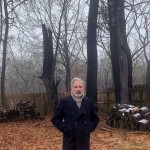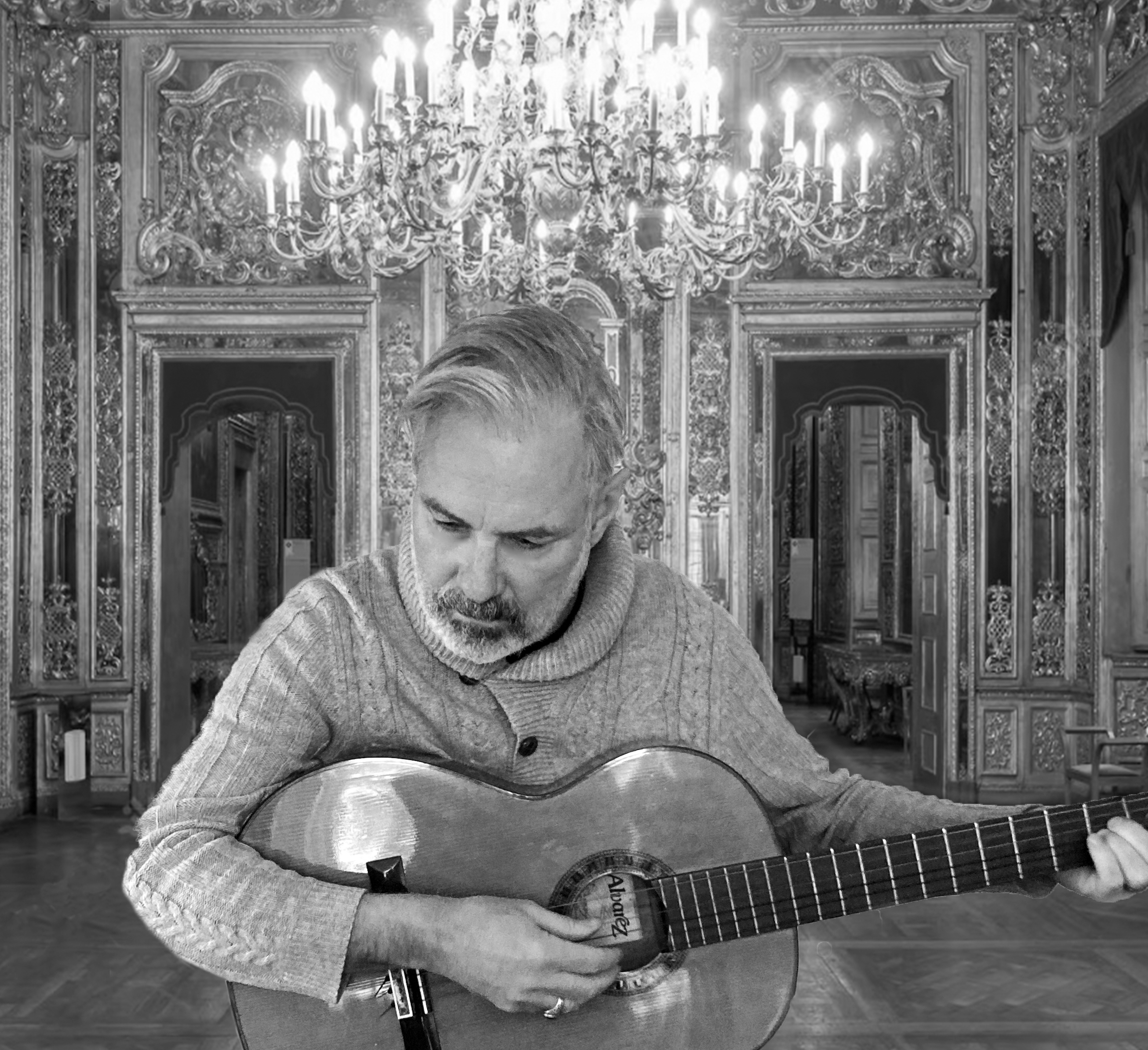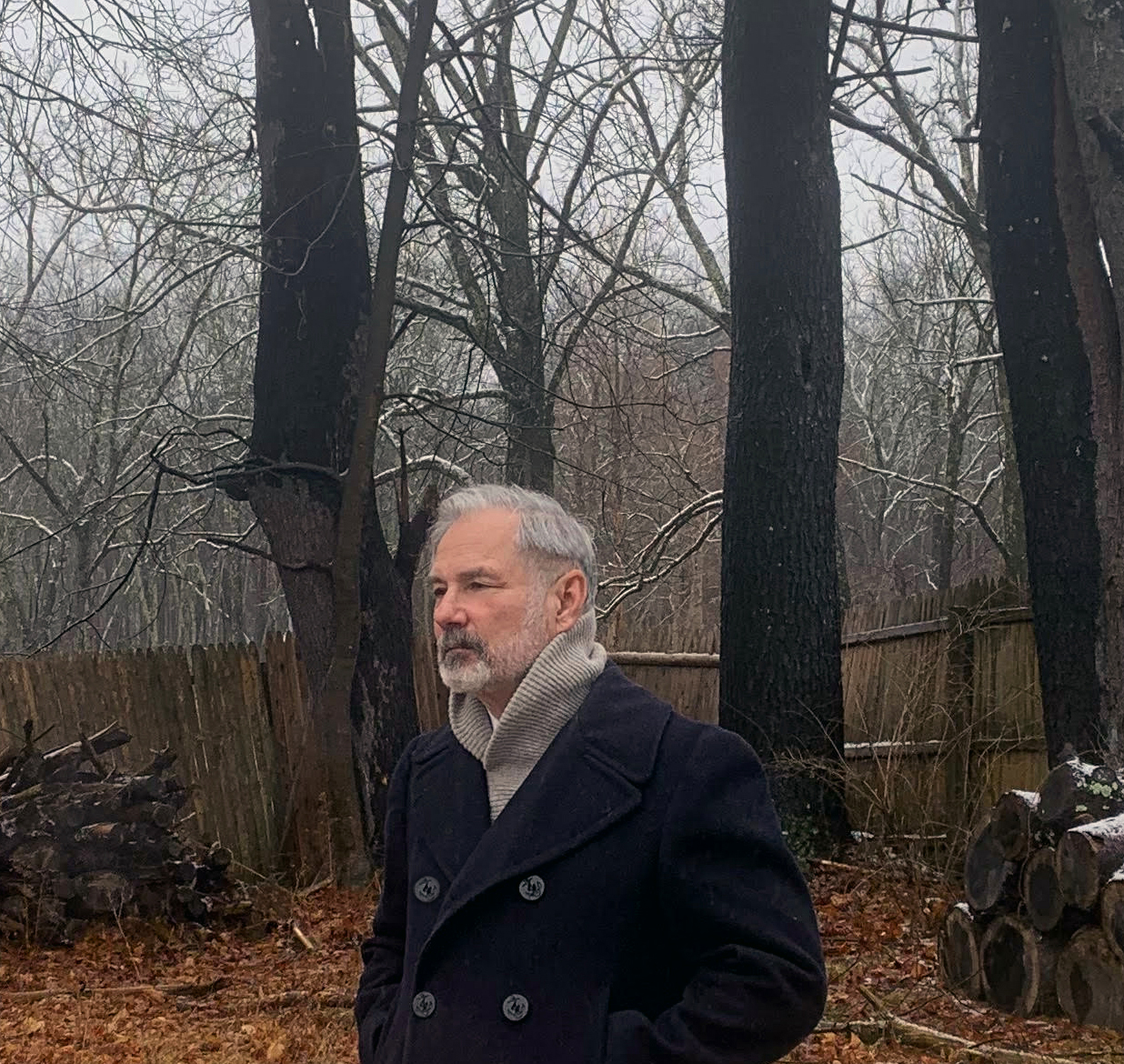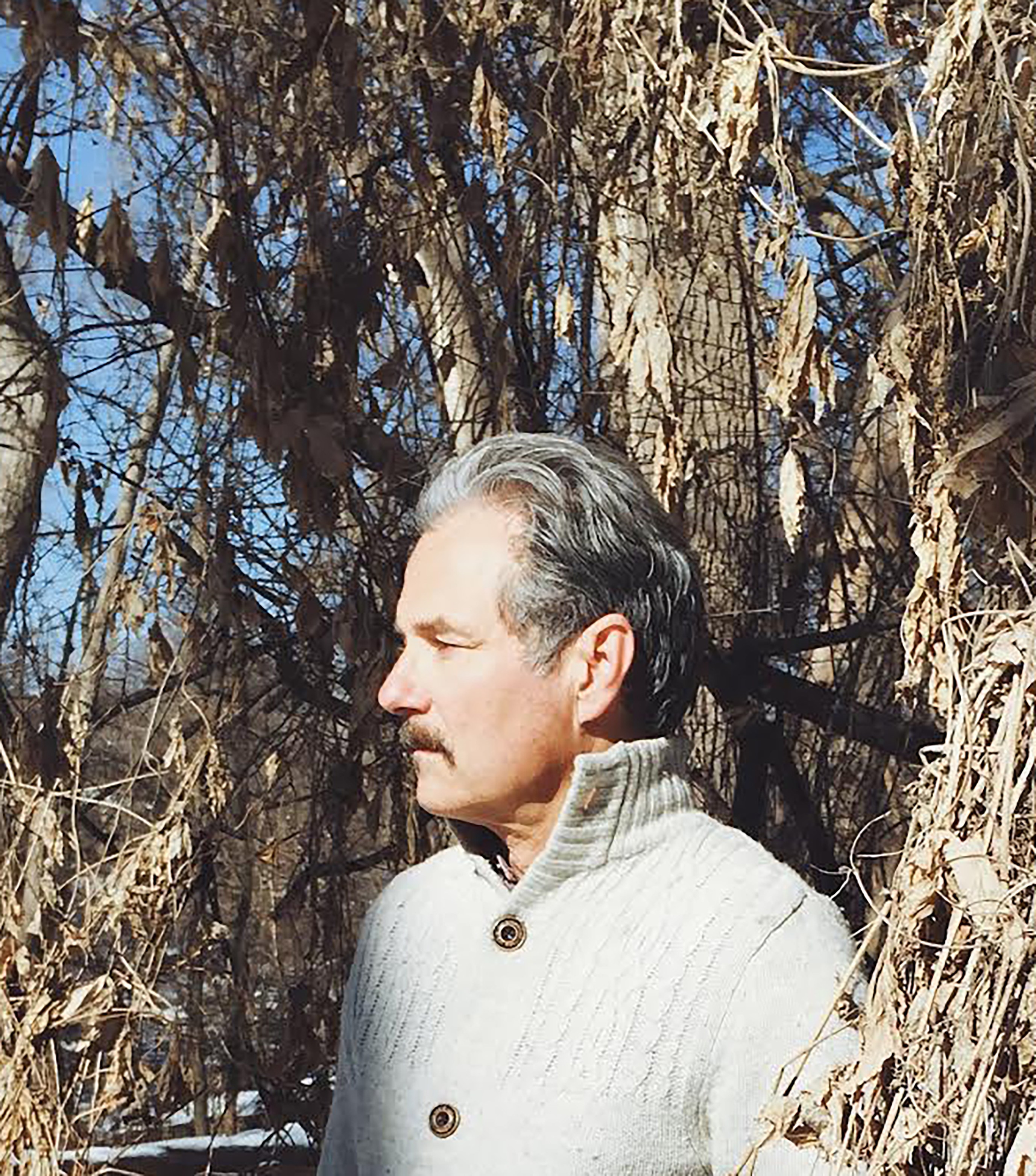 In the early 90s, Joseph Budenholzer, who was living in New York at the time, founded the band Backworld, which was characterised by changing line-ups. In the years that followed, the band released a series of albums, initially via World Serpent, and despite some somewhat lengthy breaks between releases, it is hard to imagine the world of dark, mystical folk music without them today. In retrospect, Budenholzer himself sees the continuities, which lasted over time, and indeed the search for transcendence, the exploration of the associated borderline experiences and the range between sweet acoustic folk, solemn and sombre recitations and catchy melodies has always remained in a certain way, even though the music, for which he uses the term “paraliturgical”, has over the years always allowed for other sides – British-inspired dark folk, Americana influences, ritual and even opera. The following interview is about all these sides and the brackets that hold them together, as well as about the new album planned for spring.
In the early 90s, Joseph Budenholzer, who was living in New York at the time, founded the band Backworld, which was characterised by changing line-ups. In the years that followed, the band released a series of albums, initially via World Serpent, and despite some somewhat lengthy breaks between releases, it is hard to imagine the world of dark, mystical folk music without them today. In retrospect, Budenholzer himself sees the continuities, which lasted over time, and indeed the search for transcendence, the exploration of the associated borderline experiences and the range between sweet acoustic folk, solemn and sombre recitations and catchy melodies has always remained in a certain way, even though the music, for which he uses the term “paraliturgical”, has over the years always allowed for other sides – British-inspired dark folk, Americana influences, ritual and even opera. The following interview is about all these sides and the brackets that hold them together, as well as about the new album planned for spring.
Do you often listen to earlier Backworld songs these days? What would you say is the most notable change that occurred over the years?
In the process of compiling “Sacred & Profane Songs” I re-listened to the earlier albums quite a lot and was surprised by the level of continuity overall. The most notable changes have less to do with content and more with technique both in recording and performance. All the albums were engineered in my home studio beginning in the early 1990s, so they really follow the advent of digital recording. Since then not only the technology, but also my playing and producing skills have gradually improved over the years. My artistic process, interests, and obsessions have not really changed much.
One cliché about Backworld says that your music became more “American” after the first three albums. Would you (partly) agree with that, and if yes, was there a greater influence of British or other European music at the beginning of your career?
My musical influences were in place long before I started Backworld. As a child British pop music made a huge impact on me, especially the Beatles’ Abbey Road, and The White Album. On the other hand, when I was very young my father listened a lot to Western music like Gene Autry and The Sons of the Pioneers with their haunting harmonies, and “The Grand Canyon Suite” by Ferde Grofé which also left a lasting impression. Later I found post-punk and industrial music like Throbbing Gristle, Lydia Lunch, Foetus and SPK but it was the transgressive imagery and classical music elements that attracted me rather than the beats. While still living in the Midwest I found Psychic TV “Dreams Less Sweet” in a local record shop. The song “The Orchids” was a revelation to me. Then later living in New York City while writing songs for “Holy Fire” and exploring deconstructing folk ballads, I discovered “Crooked Crosses for the Nodding God” by Current 93 that used English Folk in a way I had never heard before. That inspired me to send “Holy Fire” to World Serpent Distribution and eventually I became close friends with David Tibet, Michael Cashmore, and Tony Wakeford. By the time I was working on “Of Silver Sleep”, I was spending a lot more time in the UK immersed in the Apocalyptic Folk scene and ultimately moved to Scotland. Human nature being what it is, while living in America it seemed more interesting to be an English purist, however once I moved to the UK and was surrounded by Brits my American roots started showing more, as a slight Western flavor in some songs like “Hands of Ash” and “Come The Bells”. But to be fair, even the more “American” songs are still coming from an English/European tradition in the same way that Perry Leopold, early Leonard Cohen and Buffy Saint-Marie are just re-imagining European folk. The truly American forms like jazz, blues, and R&B, are absent from my work so in that sense I don’t think I’ve strayed very far from my origins.
In the liner notes to “Sacred and Profane Songs“ you write that “there were three albums in my head ready to burst forth almost fully formed.“ Would you consider your first three albums then to be some kind of unity/trilogy and were they fully formed with regard to the concept, the lyrics, the music?
I’ve always thought of them as a trilogy of audio theater works, each meant to be listened to from start to finish. The tracks alternate between songs and lyrics with periods of instrumental music and spoken word to meditate on in between. With the benefit of hindsight, examining these like dreams, the motif is a longing for ecstatic spiritual experiences with acknowledgement of their satanic counterparts, or shadow. I mean “satanic” in the biblical tradition of Genesis, or Bulgakov’s ‘The Master and Margarita’ or Mark Twain’s ‘Mysterious Stranger’ where Lucifer, the light-bringer, tells you mind-bending truths that your not supposed to hear. In this way “Holy Fire” begins on a dark note with the Waco, Texas siege, a modern witch burning, but ends with an ecstatic hymn “The Wine That Flows”. “Isles of the Blest” revolves around the Symbolist poet Rimbaud, women Christian mystics, and Heaven’s Gate cult, which was current news at the time and a source of fascination for me. “Anthems from the Pleasure Park” is an exploration of Gnostic Christianity which takes into account the shadow, as in William Blake’s ‘The Marriage of Heaven and Hell.’
Do conscious stylistic decisions play a role in the development of your music?
Backworld’s musical range covers English folk and its American offshoots, spiritual minimalism like John Taverner and Arvo Paart, early music like Hildegard von Bingen, and psychedelic pop. Each of these styles carries different weight depending on the album. On “Of Silver Sleep” and “Good Infection” I intentionally stepped out of the complex patterns of the first three albums and simply presented a collection of songs. These albums were a stylistic departure in form but I don’t see them as very different from the others in content.
On your bandcamp site the compilation is described as “a selection of essential Backworld tracks from the last 25 years“. How did you decide which songs to choose from the respective albums?
I really just chose my personal favorites. But I also picked songs that I felt most fit the album title “Sacred & Profane Songs.” Also keeping in mind that I wanted it to be a sort of “best of” album. I deliberately left out instrumentals and tracks from “The Hound of Heaven” because I don’t see them as stand-alone pieces.
Many songs by Backworld deal with religious/spiritual aspects, but your approach to these things has come up in very different ways. Are you still occupied with these questions, and if you had to find a motto or an umbrella term for your quest, what could it be?
I would say the umbrella term is paraliturgical. This question was very evident while compiling “Sacred & Profane Songs.” I experienced the strange sensation of coming face to face with the old soul of my younger self. Now nearly 30 years later I can see the unbroken thread between what was important to me then to what is still important to me now. Only my understanding of the meaning of things has deepened, thank God, or I’d just be stuck repeating myself. So I’m still exploring the same internal terrain or Backworld I discovered as a young man but now with (hopefully) a greater understanding of what I find there. Working on the new album now it really feels like I’ve come full circle.
In some of your songs, transcendence is depicted as almost violently overwhelming in its life-changing nature (I think of songs like “Destroying Angel”, but also of “Consuming Fire” from a newer record). Was it a difficult task for you to delineate these desires and experiences still as something positive?
Luckily I have always had the ability to translate overwhelming experiences into a greater positive meaning for me. I say, “luckily” because thus far I have not been tested by anything that has shattered this ability to transcend life’s upheavals. I’m sure there is a limit to this resilience but I do pray to be spared that, if possible. A literary device that I use a lot in my writing and that informs my worldview is the “angelic perspective.” Polish artist, Tadeusz Kantor’s Theatre of Death is a wonderful example of this. Another more familiar one is the film “American Beauty” which is narrated by the main character looking back on his life from after death. In life he sees only the unfolding crisis before him. From the angelic perspective these were in fact moments full of joy.
On the other hand, you also illustrated rather carefree religious feelings in songs like “Sunday Morn”. Are both sorts of experiences of the same importance for you?
For me sometimes religious feelings are very simple and natural and other times they can feel forced. Of course I prefer simplicity. I had a strict Roman Catholic education imposed on my childhood that I built defenses against. But once that defensive wall was built the dark currents moving behind it were still driving me. As an adult I found that much of what I was taught as a child, minus the authoritarianism, was valuable to me. So I learned to drop my defenses a bit in order to access the parts I want and to avoid the rest. In this way I was able to find a wealth of resources, much of which was channeled into Backworld. I look at religious fundamentalism and nationalism with the same horror as most rational people. But on the other hand I see contemplative religious practices and transcendental magick as the most realistic solutions for pulling the world back together without repeating the mistakes of the past. In my understanding, the shadow of religious extremism is infinite light. In my songs the darkness and the carefree religious feelings come from the same source, a connection to the collective unconscious. It’s important for me to stay connected with both elements and not deny the dark stuff and allow it pull the strings from behind the curtain.
Given the title of the compilation, would you say that in your career there was a move from the profane to the sacred or that such kind of songs overlap on your albums?
I feel there is overlap and it’s more a matter of balance and how much shadow or light shows on a given album. For example “Good Infection” feels unambiguous in its simplicity but it is followed by “Come the Bells” which sort of swings the other way. It’s not a calculated or aesthetic choice but more of a reflection of where I am in my life at that particular juncture.
How and when did you come across Francis Thompson and what was it that inspired you so much that you had the idea of composing a music theatre piece?
More than twenty years ago David Tibet sent me an antique edition of the poem saying it reminded him of me. David was very instrumental in my return to my Catholic roots but this time it was Anglo-Catholic rather than Roman Catholic which also parallels Francis Thompson. I go into more detail about this in David Keenan’s book, ‘England’s Hidden Reverse.’ But I loved the poem so much that I also read a biography of Francis Thompson saw many similarities between his story and my own. The most obvious being Thompson was an opium addict on the street of London in the 1890s and I was an opioid addict on the streets of New York in the 1980s. While writing the opera I sort of mingled our stories together. Some of the scenes are from my life and some are from Thompson’s and some are experiences we both had a hundred years apart. So in my way I am channelling Thompson with the opera.
As an opera soundtrack with many guest musicians participating, it’s quite exceptional in your discography. What were the biggest challenges for you while working on this album? Do you plan more opera works in the future?
I always conceived of Backworld as an experiment theater, like liturgical music for a magick religious order, especially the first three albums. Any one of them could be staged as a one act opera. The first Backworld shows before I did an album were performance pieces that involved experimental rituals. I have a long history in theater so directing a large group is not unfamiliar but I also love the autonomy of working alone. The biggest challenge actually was creating the sheet music for the players. I’m sure there are more paraliturical operas in Backworld’s future.
You decided not to include any of the pieces from “The Hound of Heaven“ on the compilation and of course it’s a very special release and musically quite different from your other records. Do you feel that it maybe should have been released under your own name instead of Backworld?
More than any of the other albums, “The Hound of Heaven” stands alone as a whole and shouldn’t be broken up. Also as a very limited handmade edition I don’t consider it properly released yet. I am working on a revised version that will hopefully come out on vinyl in 2023. I have no qualms about calling “The Hound of Heaven” a Backworld album. I’ve written two more operas in collaboration with Ridge Theater in NYC. One is “The Women of Berlin” an adaptation of “The Trojan Women” by Euripedes, loosely based on the “A Woman in Berlin” by Marta Hillers. The other is an adaptation of Wedekind’s “Lulu”. I’m very proud of both of these but they don’t belong with Backworld.
After a longer pause it seemed that “Come The Bells“ was a return to more sombre music. It almost had a certain quality of a kind of dark chamber music. Could you say a few words of how that album came into being and about the central ideas?
This was finished the year my father died and is dedicated to him. I was present by his death bed and very taken by the peacefulness of his passing and very conscious of the liminal door he stepped through — one minute he was there, the next he was gone. That is central idea. It was also heavier on instrumental pieces I think because it felt like words failed me at that time.
On your social media you recently shared an excerpt of a new song named “Return of the Burning Times”, which seems inspired by Truffaut’s “Fahrenheit 451″ movie. Which was the main impulse for you to deal with this topic?
I have always thought it important to remember the lessons of the Witch Trials. Backworld is not political by any means, but I’m always on the alert for out-of-control archetypes erupting in mass culture and it feels like a huge historical upheaval is currently happening that cannot be ignored. It’s no coincidence “The Handmaid’s Tale” and “The Man in the High Castle” were both very popular TV series in the past five years.
I recently re-read Bradbury’s novel and I found it quite striking how much it anticipates current debates about sensitivity readers, banning books etc. If I remember correctly, you used to work in publishing or layouting (in the past?). How do you feel about the current attack on books from both left and right (if you think of DeSantis in Florida trying to ban every text and tek with some trace of LGBTQ+ content or anything that does not fit his narrow(minded) view of how the USA should be)? When having a look at the increasing polarization in the USA (as well as other countries) and the ferocity with which that which has been called “culture war“ is fought, would you say that the country is in danger of entering or has already entered a “New Dark Age“ or is on the verge of a new civil war?
I agree America is out of control with a revival of puritanical fervor and radical fundamentalism from both sides of the fence. I don’t really belong to either camp of the culture war. To me they are just two sides of the same coin. So I stay close to my own center and try to keep balanced, and pray.
We are of course curious about the new Backworld-album. Would you say that the two songs that were recorded in 2020 are an indication of what to expect?
Neither of those songs will be on the new album but the other songs were written along side them during lockdown so thematically they will be similar. Some demos of new songs are up on instagram “The Return of the Burning Time” and “All Things” are previews of what is to come.
Interview: M.G. & U.S.
